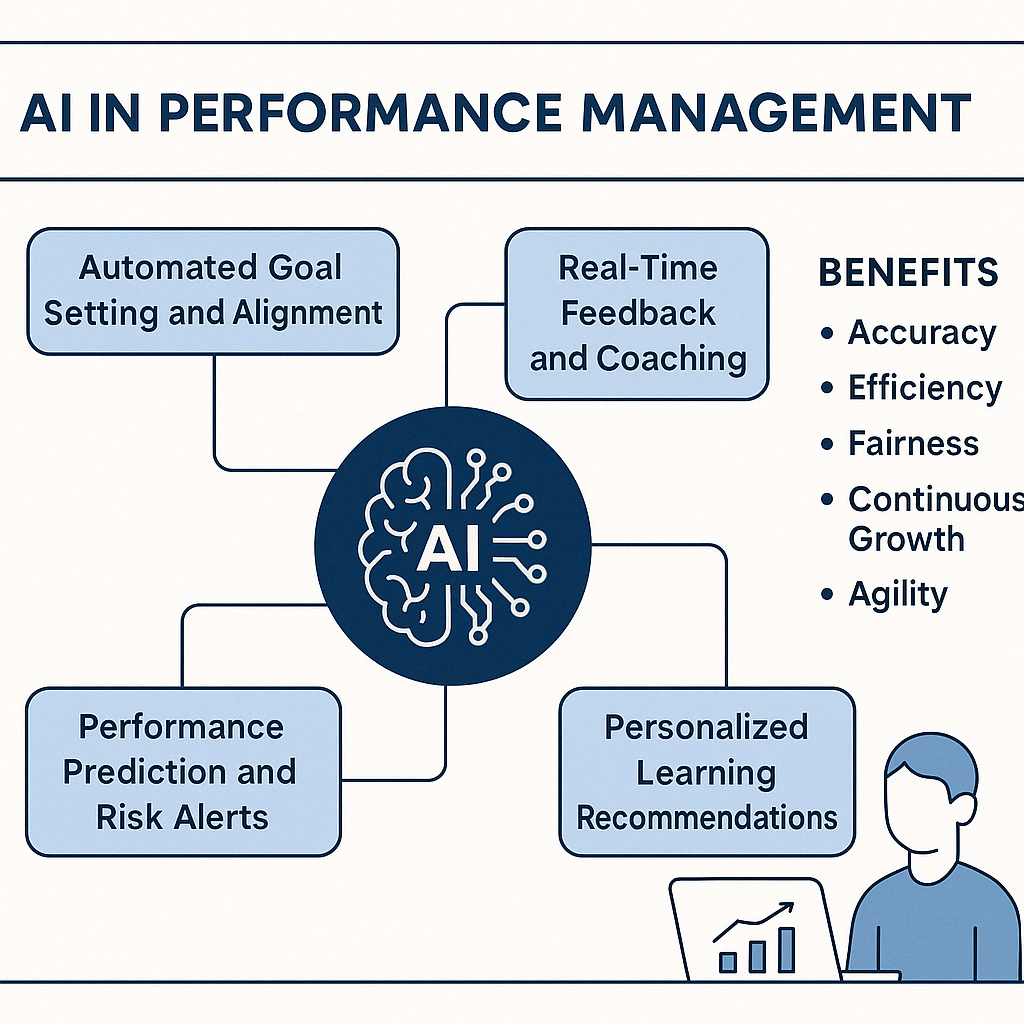AI in Performance Management: Redefining How Organizations Measure and Improve Performance
What Is AI in Performance Management?
AI in Performance Management refers to the integration of artificial intelligence technologies—such as machine learning, natural language processing (NLP), and predictive analytics—into the processes used to assess, monitor, and improve employee performance.
Instead of relying on manual evaluations and annual reviews, AI enables continuous, data-driven, and personalized performance tracking that empowers employees and managers alike.
Key Capabilities of AI-Driven Performance Management Systems
1. Automated Goal Setting and Alignment
AI can recommend SMART goals based on role, team objectives, and past performance patterns, helping align individual contributions with organizational priorities.
2. Real-Time Feedback and Coaching
Through sentiment analysis and behavioral data, AI tools provide continuous feedback and nudges, enabling managers to act on performance trends in real time.
3. Performance Prediction and Risk Alerts
Predictive analytics identify early indicators of underperformance, burnout, or disengagement, allowing for timely interventions and support.
4. Bias Reduction in Evaluation
AI helps minimize unconscious bias in performance reviews by analyzing objective data and offering standardized scoring frameworks.
5. Personalized Learning Recommendations
AI links skill gaps to curated training paths, delivering customized upskilling opportunities directly to employees based on their performance trends.
Benefits of Using AI in Performance Management
Benefit | Description |
|---|---|
🎯 Accuracy | Reduces subjectivity by relying on consistent, data-backed insights |
⏱️ Efficiency | Automates time-consuming review processes, freeing managers to focus on coaching |
👥 Fairness | Identifies patterns that remove bias and favoritism in evaluations |
📈 Continuous Growth | Enables employees to receive ongoing feedback, not just annual reviews |
🔁 Agility | Supports rapid adjustment of goals in response to business changes |
Practical Use Cases
360-Degree Feedback Analysis
NLP tools analyze open-ended feedback to extract sentiment and behavioral themes.Sales Performance Forecasting
AI predicts sales success based on CRM data, client interaction patterns, and peer benchmarks.Learning & Development Integration
Based on current performance, employees receive automated course suggestions or mentoring offers.Leadership Pipeline Development
AI identifies high-potential employees by scoring behavioral signals across multiple data sources.

AI vs Traditional Performance Management
Feature | Traditional | AI-Powered |
|---|---|---|
Feedback Frequency | Annual | Continuous |
Decision Drivers | Manager opinion | Data + behavior modeling |
Goal Tracking | Manual | Real-time + automated |
Personalization | One-size-fits-all | Adaptive based on role & data |
Bias Handling | High risk of bias | AI mitigates subjective scoring |
Challenges and Considerations
Data Privacy: Ensure sensitive employee data is handled securely and in compliance with regulations (e.g., GDPR, CCPA).
Transparency: Clearly communicate how AI makes decisions to build trust and avoid "black box" concerns.
Change Management: Provide training to managers and HR teams to interpret and act on AI-generated insights.
Avoid Over-Reliance: AI augments but should not fully replace human judgment and empathy.
Future Trends in AI for Performance Management
Emotion AI: Real-time analysis of employee tone and mood from communication tools.
AI-Generated Coaching Plans: Tailored development paths based on team goals, behavior, and historical data.
Cross-Platform Data Integration: AI will unify performance data across systems (e.g., project management, LMS, collaboration tools).
Voice & Video Performance Review Analysis: Evaluating communication and leadership cues through advanced audio/visual data processing.
FAQ: AI in Performance Management
Q1: Does AI replace human managers in performance reviews?
No. AI enhances managers' decision-making by providing data-driven insights and suggestions, but human input remains essential for context and empathy.
Q2: Is AI in performance management only for large enterprises?
While early adoption started with large companies, many modern AI tools are now affordable and scalable for small and medium-sized businesses (SMBs).
Q3: How does AI identify poor performance or burnout?
AI detects behavioral changes—such as reduced productivity, irregular work patterns, or low engagement—and flags them as early warning signals.
Q4: Are AI-powered systems biased?
AI can reduce bias if trained on clean, representative data. However, biased training data can perpetuate inequalities, so it's essential to audit AI models regularly.
Conclusion
AI in Performance Management is not about replacing human leadership—it’s about amplifying it with insight, consistency, and speed. By harnessing artificial intelligence, companies can create a performance culture that is dynamic, fair, and growth-oriented—ultimately enabling every employee to reach their full potential.
HR Glossary: Master the Language of Modern HR
From recruiting candidates to onboarding new team members, MokaHR gives your company everything you need to be great at hiring.
Subscribe for more information

